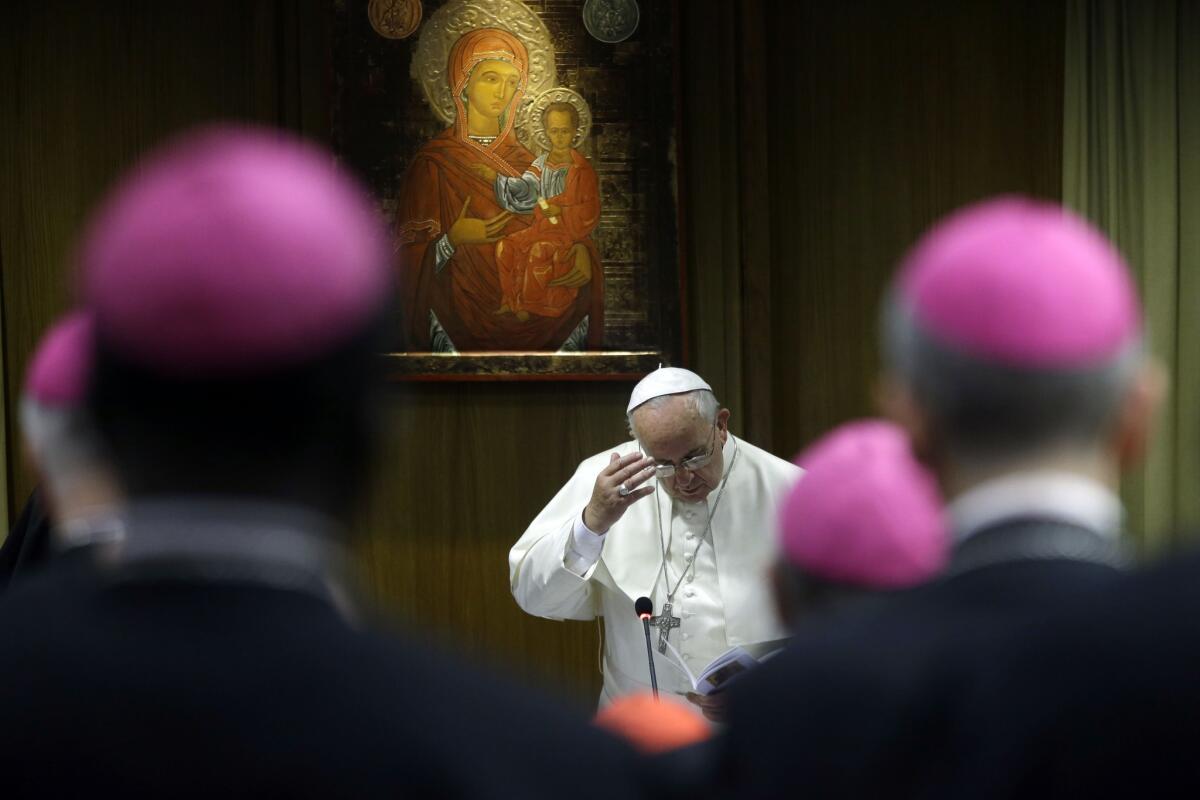Catholic leaders at synod backtrack on welcoming gays to the church

- Share via
Reporting from Rome — A gathering of bishops and cardinals at the Vatican on Saturday backtracked on an interim document released early last week that showed greater openness to homosexuals, suggesting that Pope Francis’ effort to move toward a more inclusive Roman Catholic Church had been blocked for now by conservative prelates.
The Vatican issued the draft summary of speeches midway through the two-week synod on family issues, with one section titled “Welcoming homosexual persons.” It stated that homosexuals had “gifts and qualities” and should be offered a “fraternal space” in the church.
The draft document showed no shift from Catholicism’s doctrinal opposition to homosexual sex or gay unions. But it was widely interpreted as a moderation of the Vatican’s traditionally harsh tone on homosexuality and reflected Pope Francis’ statement “Who am I to judge?” when asked last year about the issue.
However, in the synod’s final document put up for vote Saturday, the section — which had been widely praised by gay rights groups — was altered after conservative bishops had objected to the language.
The section was retitled “Pastoral attention to people of homosexual orientation.” While it includes language welcoming homosexuals into the church with “respect and delicacy,” it tackles the topic from the point of view of “Families who live out the experience of having people in their midst with homosexual orientation,” rather than addressing homosexuals as individuals.
The language on homosexuals having “gifts and qualities” and the offer of “fraternal space” was dropped from the final version.
Furthermore, when each point of the report was put to the vote Saturday, the key paragraph on homosexuals narrowly failed to gain the two-thirds approval required under usual synod rules, with 118 for and 62 against, suggesting that even the less moderate tone was deemed too welcoming.
Two points in the final report involving proposals to end the ban on giving communion to divorced Catholics who remarry and that go no further than saying “the question must be more closely studied” were also considered too strong by many participants. They failed to win two-thirds support, even though the issue had the backing of Cardinal Walter Kasper, a close ally of Francis.
All three of the voted-down passages were nonetheless inserted in the published version of the final synod document Saturday, along with the vote tally, on the orders of Francis.
Vatican officials pointed to another synod on family matters planned for next October as providing the church’s conclusive debate, after which Francis will make any final decisions on the issues.
“The rules talk about a two-thirds majority, but that would be for a final document and this is a working document for a follow-up synod next year,” Vatican spokesman Father Federico Lombardi said.
“The vote count was useful to show that all points had an ample consensus, even if not two-thirds,” he said. “There was no need to cancel them from the document because these are themes we have to develop.”
Cardinal Reinhard Marx of Munich, an ally of the pope, said ideas proposed at the synod would not go away. “There have been two steps forward, there may be one step backward, but certainly not two,” he told reporters.
In a speech to prelates at the end of the synod, Francis drew a line between a temptation by prelates to reject change because of “hostile rigidity” and a temptation to be overly “progressive and liberal.”
The debate seen at the synod was positive, and there is another year to reach conclusions before the next synod, he said. But though his speech received a four-minute ovation from prelates, the synod may yet come to be seen as the moment Francis’ papacy faltered.
By allowing the issuing of the draft report with its strong openings on topics such as homosexuality, Francis may have hoped to catch conservatives off balance and push them into accepting his views as a done deal. However, bishops were unafraid to vocally call for a pullback in the second week of the synod.
Cardinal Wilfrid Fox Napier of South Africa, who helped draft the revised final report, told Vatican Radio the draft had been presented as the condensed view of the whole synod, when in fact it was the view of “one or two people,” adding, “and that made people very angry.”
Francis has however apparently claimed one victory. On Saturday, conservative American Cardinal Raymond Burke, head of the Vatican’s supreme court and one of the fiercest critics of the draft synod report, said he had been demoted to a less important role at the Vatican.
Kington is a special correspondent.
More to Read
Sign up for Essential California
The most important California stories and recommendations in your inbox every morning.
You may occasionally receive promotional content from the Los Angeles Times.










